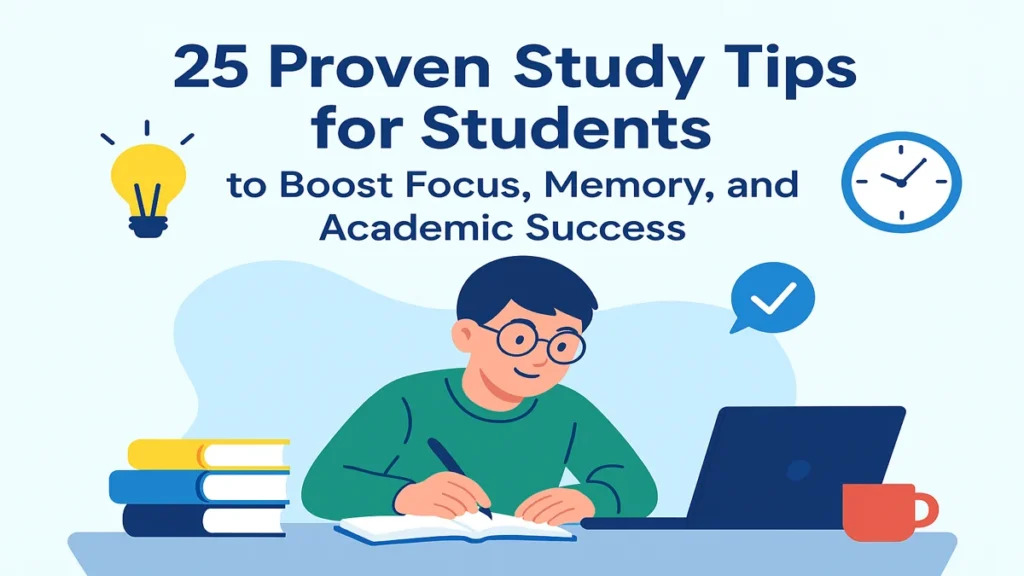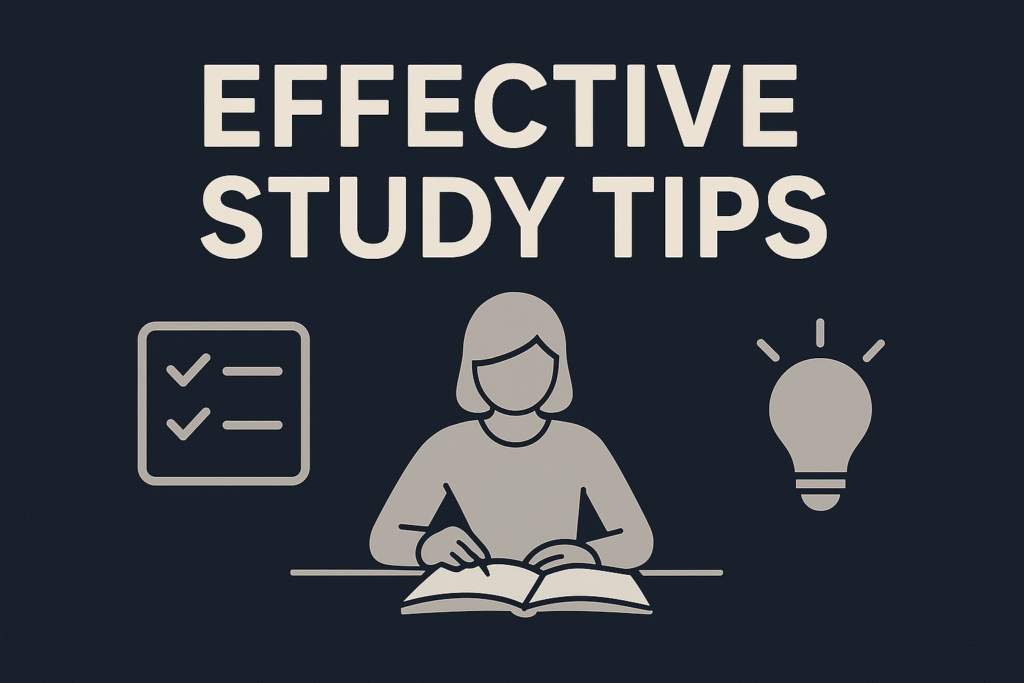
Introduction
Studying is not just about long hours with books; it’s about studying smart. Many students face issues with focus, procrastination, and remembering what they read. If you’re preparing for school, college, competitive exams, or professional courses, the right study techniques can make a big difference.
In this article, you’ll find 25 scientifically proven study tips that will help you stay productive, remember more, and perform better in exams. These strategies work for all students, whether you’re in high school, college, or preparing for law, medicine, or UPSC exams.
Applying effective study tips is essential for academic success.
Why Study Tips Are Important
Before looking at the techniques, let’s understand why you need structured study strategies:
- Helps you retain information longer.
- Saves time by improving focus and efficiency.
- Reduces exam stress and anxiety.
- Builds a habit of self-discipline and consistency.
Effective Study Tips to Enhance Learning

- Set Clear Study Goals https://www.openpolytechnic.ac.nz/current-students/study-tips-and-techniques/get-ready-for-learning/set-study-goals/
Define what you want to achieve in each session. Instead of saying, “I’ll study history today,” say “I’ll complete the causes of World War II and revise key dates.” - Follow the Pomodoro Technique
Study for 25 minutes, then take a 5-minute break. After four sessions, take a longer 15-20 minute break. This prevents burnout. - Create a Dedicated Study Space
Choose a clean, quiet, and distraction-free place for studying. Avoid studying on your bed; it signals your brain to sleep, not to focus. - Use Active Recall
Test yourself after reading a topic. Close the book and recall key points instead of re-reading. - Practice Spaced Repetition
Review information at increasing intervals (1 day, 3 days, 7 days, etc.). Apps like Anki or Quizlet make it easier. - Make Flashcards
Flashcards are great for memorizing definitions, laws, formulas, and case studies. - Use the Feynman Technique
Teach a concept in simple words as if explaining to a child. If you can explain it simply, you truly understand it. - Take Handwritten Notes
Writing helps improve retention. Summarize each lecture in your own words instead of copying text. - Use Mind Maps & Diagrams
Visual learners benefit from flowcharts, diagrams, and mind maps. They make connections clearer. - Eliminate Digital Distractions
Turn off notifications or use apps like Forest or Stay Focused to block social media while studying. - Study in Short Sessions
Don’t cram for 5 hours straight. Break study time into smaller chunks with regular breaks. - Prioritize Difficult Subjects First
Tackle tough topics when your energy is highest, usually in the morning. - Revise Before Sleeping
A short 10-15 minute review before bed helps your brain consolidate memory. - Practice Previous Year Papers
Solving past question papers boosts confidence and exam readiness. - Use Online Learning Tools
Platforms like Coursera, YouTube Edu, or Khan Academy can simplify complex concepts. - Stay Hydrated & Eat Brain-Boosting Foods
Drink water and eat foods like nuts, berries, and fish to improve focus. Avoid junk food before study sessions. - Group Study Wisely
Study groups can help if everyone is serious. Otherwise, they can become a distraction. - Use the SQ3R Method
Survey, Question, Read, Recite, Review. This improves comprehension in reading-heavy subjects. - Record Lectures & Replay
Listening to lectures again helps you revise without opening books. - Mix Subjects (Interleaving)
Instead of studying one subject for 3 hours, mix subjects to keep your brain active. - Avoid Multitasking
Focus on one subject at a time. Switching between tasks reduces productivity. - Sleep Well
7-8 hours of sleep improves memory retention and concentration. - Reward Yourself
After completing a tough topic, reward yourself with a short walk, music, or a snack. - Stay Consistent
Consistency beats last-minute cramming. Even 2 focused hours daily is better than 10 hours once a week. - Maintain a Positive Attitude
Believe in yourself. Motivation and mindset play an important role in long-term academic success.
Best Study Routine for Students
- Here’s a sample study routine you can follow:
- Morning (7-9 AM): Revise tough subjects (Law, Science, Math).
- Afternoon (2-4 PM): Read theory subjects (History, Sociology).
- Evening (6-8 PM): Practice questions, solve past papers.
- Night (30 mins before bed): Revise key notes & flashcards.
These study tips can significantly enhance your learning experience.
Common Mistakes Students Make
- Cramming the night before exams.
- Highlighting everything instead of summarizing.
- Studying with the phone nearby.
- Ignoring breaks, leading to burnout.
- Not practicing questions under timed conditions.
Remember, the right study tips can make your learning journey more effective.
Incorporating various study tips will help improve your academic performance.
Utilizing these study tips will help you maintain a positive mindset.
Following these study tips ensures you are well-rested for optimal learning.
Instead of cramming, use these study tips to prepare effectively.
For more successful outcomes, implement these study tips into your routine.
Understanding common mistakes can enhance the effectiveness of your study tips.
To avoid pitfalls, refer back to these study tips often.
to read more articles like this click here

Leave a Reply